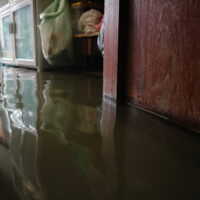Filing a Flood Insurance Claim: What You Need to Know

When many people think of hurricane damage, they envision roofs blown off houses and downed trees. In other words, they see wind damage. But flooding is a huge problem as well. Hurricanes can dump a tremendous amount of water in a very short time. High winds can also cause storm surge that can swamp buildings close to shore.
If you need to make a flood insurance claim, there are certain things you should keep in mind. If you have a question, speak with a Daytona Beach hurricane insurance claim attorney at Bundza & Rodriguez.
Notify Your Insurer
Contacting your insurer is the recommended first step. Why? Because you don’t want to create any doubt that the water damage you have suffered actually stems from the storm that just hit Florida.
You should contact them as soon as possible. You will need your policy number, the name of your insurance company, and your contact information. The insurer will have an adjuster contact you within 2-3 days, typically. If you don’t hear from them, then you can call the insurance company.
Document the Water Damage
Water-soaked items should be removed from your home so that they do not cause toxic mold to grow. However, avoid throwing things in a dumpster. Instead, you should document the water damage by taking pictures of damaged property or recording video before disposing of water-logged items.
Also create a list of all damaged property. FEMA recommends that you pull together the following information for anything damaged by the flood:
- Date of purchase
- Price
- Any receipts or other proof of cost, if available
Keep all this information in a water-proof file folder that you carry with you at all times. Don’t leave this folder in the home, where it could be damaged.
Don’t forget to also document the structural damage to the home. Floodwaters can damage the supporting walls and beams, as well as the foundation. If floodwater is still standing in the home, then get pictures or video of that as well.
Create a Proof of Loss Statement
This statement supports your insurance claim and should be filed within 60 days. Your adjuster should help you complete the Proof of Loss statement, which should be signed under penalty of perjury, so you want it to be as accurate as possible. As part of the Proof of Loss you can include your receipts and any other documents related to damaged property.
Settle Your Claim
You and your insurer need to agree to a loss amount before you will receive a check. Often, this step goes smoothly. Sometimes, disputes break out over the value of damaged items or whether the floodwaters truly caused the damage. Some insurers might claim that damage falls outside the policy.
If you are unhappy with the amount offered, you should contact an attorney to help you with your claim. After hurricanes and other disasters, some insurers drag their feet or make lowball offers to their clients to save money. Hire a Daytona Beach lawyer at Bundza & Rodriguez for help. You can call to schedule a confidential consultation by calling 386-252-5170.
https://www.daytonalawyers.com/how-to-buy-hurricane-insurance/
